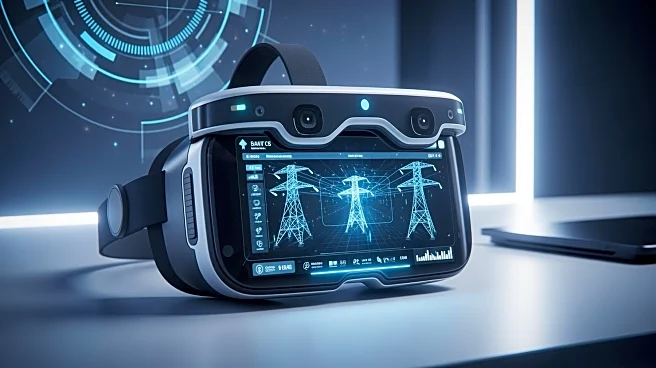What's Happening?
Duke Energy is leveraging immersive technology, specifically Extended Reality (XR) and Virtual Reality (VR), to improve workforce efficiency and safety. Jenny Taylor, the Lead of Digital Transformation and Innovation in XR/VR at Duke Energy, is spearheading
these initiatives. The company has developed qualification suites for its Natural Gas Business Unit and Commercial Renewables Electrical Operator qualifications, which have resulted in significant cost savings and increased employee engagement. These suites have shown a reduction in time and travel costs, with a projected overall savings of $500,000 annually. Duke Energy measures the return on investment (ROI) through cost savings and employee satisfaction, despite challenges in quantifying certain benefits like safety improvements.
Why It's Important?
The adoption of immersive technologies by Duke Energy represents a significant shift in how utility companies approach workforce training and operational efficiency. By integrating XR and VR, Duke Energy is not only enhancing the skill set of its employees but also improving safety standards, which is crucial in the energy sector. This move could set a precedent for other companies in the industry, potentially leading to widespread adoption of similar technologies. The positive feedback from employees suggests that immersive tech could become a standard in training programs, offering a more engaging and effective learning experience.
What's Next?
Duke Energy plans to continue refining its XR initiatives, focusing on improving hardware options to better fit enterprise needs. The company is looking for advancements in Mixed Reality (MR) hardware, aiming for lightweight headsets that integrate seamlessly with XR development software and AI. As the technology evolves, Duke Energy anticipates further enhancements in training methods and operational risk management. The company is also likely to expand its use of immersive tech across other divisions, potentially influencing industry standards and practices.
Beyond the Headlines
The integration of immersive technologies in the energy sector could have broader implications, including ethical considerations around data privacy and the impact on traditional training methods. As XR and VR become more prevalent, companies will need to address concerns related to cybersecurity and the potential displacement of conventional training roles. Additionally, the cultural shift towards tech-driven training could influence employee expectations and job satisfaction, prompting companies to adapt their workforce management strategies.


















